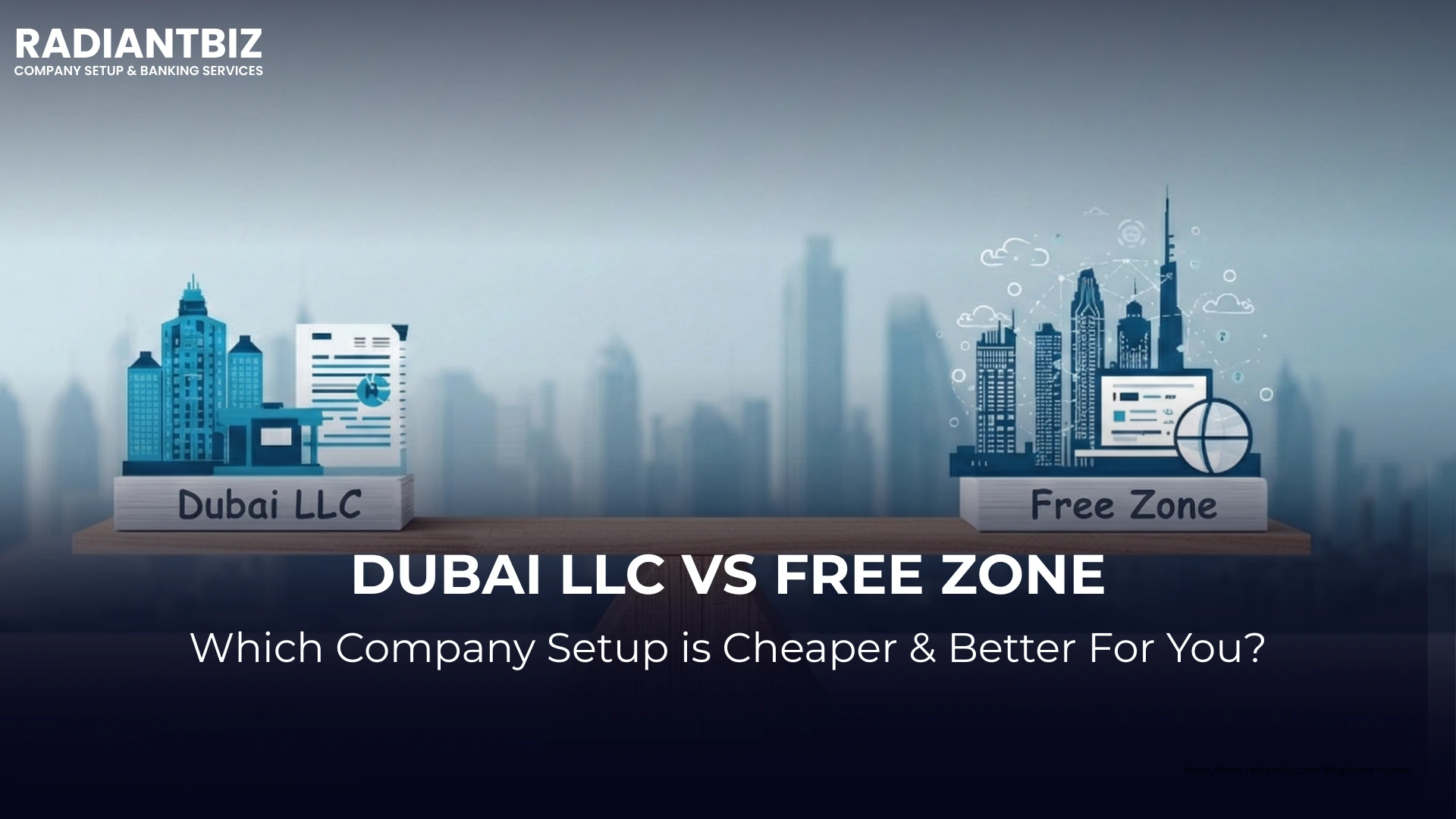Intellectual Property Protection Through Offshore Structures in Dubai


Table of Contents
Intellectual property (IP), or the intangible assets of an enterprise, is arguably the most valuable yet vulnerable business asset in a digital-first economy. From software and algorithmic code to unique brand identities and multimedia content, these assets drive innovation, competitiveness, and economic growth. But they also open businesses to great vulnerability, legal dispute, cyber piracy, competitor abuse, and even geopolitical unrest. That is where the offshore company formation asset protection strategy becomes not just timely, but essential.
Dubai has made itself a world hub for intellectual property structuring and asset protection, particularly via its offshore centers. As a founder of a startup, innovative entrepreneur, or multinational with a well-established presence, Dubai's offshore structures offer a solid legal framework to safeguard IP, reduce taxation, and grow operations without compromising ownership or control.
Understanding the Value of Intellectual Property
Intellectual property includes a wide array of assets that are not tangible in form but of immense commercial value. These include trademarks (brand names, slogans, logos), patents (innovative inventions and technical processes), copyrights (creative content such as software, videos, or books), and trade secrets (formulas, designs, business models). These are all part of a firm's brand image, market differentiation, and final profitability.
Unfortunately, most businesses do not appreciate the importance of actively safeguarding their IP, especially at the early stage of growth. This lack of attention may lead to legal conflicts, infringement, or loss of ownership. As e-commerce is global, a sound IP protection strategy is as crucial today as product development or advertising.
Why Dubai is an Ideal Jurisdiction for IP Protection
Dubai offers a perfect mix of benefits that make it highly attractive for business owners and businesses intending to protect assets with offshore company licensing. Located between Europe, Asia, and Africa, Dubai makes it simple to access world markets. Geographical convenience is complemented by a forward-looking regulatory framework and a business-friendly environment in existence to support asset protection as well as cross-border commerce.
One of the core strengths of Dubai’s ecosystem is its strong legal framework, particularly in relation to intellectual property. The UAE is a signatory to several international agreements, including the World Intellectual Property Organization (WIPO) and the Agreement on Trade-Related Aspects of Intellectual Property Rights (TRIPS). This ensures that IP protections in Dubai align with global standards, offering credibility and enforceability across borders.
Besides, Dubai has created specialized offshore jurisdictions and areas optimized for holding assets and IP. These include JAFZA Offshore (Jebel Ali Free Zone), RAK International Corporate Centre (RAK ICC), and the Dubai International Financial Centre (DIFC), each having various advantages for IP-oriented enterprises.
What is an Offshore Structure?
An offshore company is a legally licensed entity outside the nation of domicile of its owners, usually within a location that has beneficial taxation rules, asset protection provisions, and secrecy. Offshore structure is normally utilized for owning and controlling intellectual property independently of the business operation.
By transferring the rights of intellectual property to an offshore company, businesses can ring-fence their assets. That is, regardless of the difficulties that the operating entity may experience in a legal, financial, or operational sense, the IP is protected in a separate, insulated environment. This structure not only becomes useful for protecting assets but also for value extraction of IP through royalty contracts and licensing.
The Process of Utilizing Offshore Companies for Protecting IP in Dubai
Setting up an offshore company in Dubai to safeguard IP involves several crucial steps. First, a correct IP audit must be conducted to identify and categorize all intellectual property assets belonging to the company. This includes identifying whether the assets are recorded correctly and identifying their market value.
The second is to choose the right jurisdiction for offshore license. JAFZA offshore is strongly reputed for its regulatory strength and is often the first choice of large corporations and technology firms. RAK ICC, being affordable and flexible, is extremely popular with startups and creatives. DIFC offers a common law framework, which is extremely popular with companies involved in international transactions and financial services.
Once the jurisdiction has been selected, the offshore company is formed through the assistance of licensed agents or consultants. This entails drafting the necessary legal papers, licensing the entity, and adhering to local regulations. The company may also be obliged by certain offshore jurisdictions to maintain a local address or economic presence, especially under new worldwide anti-tax avoidance measures.
After the company is incorporated, its intellectual property is legally transferred to the offshore entity through assignment agreements. Documentation in the form of valuation reports and IP application updates must accompany the legal transfer for clarity and compliance. The final step is the offshore company licensing back the IP to the operational entities so that they can use the assets against royalties or licensing payments.
Tax, Licensing, and Strategic Benefits
One of the most compelling arguments for protecting assets via offshore company formation in Dubai is the favorable tax environment. Offshore entities in the UAE typically enjoy no corporate tax, no personal income tax, and no capital gains tax. This offers tremendous benefits for companies to manage their worldwide tax exposure lawfully and efficaciously.
By structuring licensing agreements between the offshore IP holding company and the operating companies, companies can receive royalty income in a tax-free environment. These royalties are typically tax-deductible to the payer company, a win-win. Offshore holding of IP also simplifies revenue remittance and enhances the business' attractiveness to investors who desire clearly structured asset ownership structures.
Another significant advantage is legal risk mitigation. Separation of IPs ownership from operations minimizes exposure of strategic assets to litigation claims, creditor procedures, or operational disruption. In the event of insolvency or disagreements, the offshore vehicle protects IPs from getting entangled in legal proceedings.
Confidentiality and privacy are also key considerations. A majority of offshore jurisdictions in Dubai provide high levels of privacy for directors and shareholders, providing an additional level of protection for entrepreneurs who care about reputational or strategic confidentiality.
Legal Compliance and Pitfalls to Avoid
While offshore structuring offers significant advantages, it also comes with obligations. The global regulatory environment has become more stringent in recent years, particularly with the enactment of the OECD's Base Erosion and Profit Shifting (BEPS) measures and the UAE's Economic Substance Regulations (ESR). These rules compel some offshore companies to demonstrate true business activity, such as the presence of staff, office complexes, or active decision-making in the UAE.
Transfer pricing is another area where attention is being focused. In the case of licensing IP among related parties, fair market value must be ensured in the price. Failure to comply with arm's length pricing can lead to audits, fines, or challenges by tax authorities.
Besides, offshoring ownership of IP does not diminish the need to license locally. To enforce IP rights effectively in those markets where business is being done, trademarks, patents, and copyrights have to be licensed in such countries, even if the ultimate ownership is an offshore company.
Firms should also be careful not to create structures that are not strategically motivated. Firms with no substance created only for tax avoidance reasons can lead to regulatory issues and damage credibility. It is therefore essential to ensure that offshore structures are underpinned by good business rationale, operational justification, and legal compliance.
Real-World Use Cases
Numerous firms across the world have adopted offshore strategies in Dubai to protect their IP and optimize. An example such as that of a software development firm with confidential algorithms and code that shifted their intellectual property to a RAK ICC company. By licensing the software back to its onshore company, it will be able to manage its licensing revenue and protect the core technology from litigation.
Similarly, an internet fashion brand can relocate its trademark portfolio into a JAFZA offshore holding company. This move will not only protect the brand from supply chain-related lawsuits but also allow founders to license the brand to franchises in other markets without risking their crown jewel.
Another example would be a digital content creator who has centralized ownership of multimedia assets in an offshore vehicle. It becomes more convenient and tax-efficient to license content to numerous platforms and media companies, creating long-term passive income and reducing exposure to local regulation changes.
As the digital economy becomes more complex and interlinked, protecting your greatest assets is about more than mere licensing under the law, it requires strategic thinking and international planning. Intellectual property is often the crown asset of the business, and losing control of it can amount to losing everything.
Dubai offers one of the world’s most forward-thinking environments to protect assets with offshore company formation. Whether you are safeguarding brand identity, digital content, proprietary technology, or trade secrets, setting up an offshore IP holding company in the UAE can provide a layer of legal security, financial efficiency, and operational clarity.
By approaching IP protection with a long-term mindset and leveraging Dubai’s offshore jurisdictions, businesses of all sizes can future proof their assets, enhance global scalability, and build a stronger foundation for innovation and growth.
Seek our professional on-the-ground guidance, contact us via mail at info@radiantbiz.com or WhatsApp & call us at +971 55 234 7124!



2.png)




.avif)